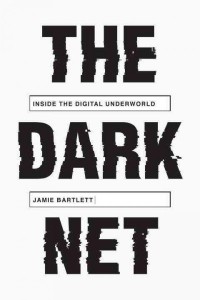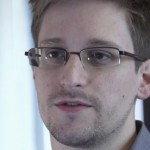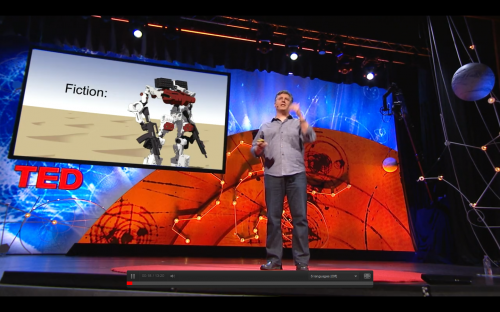The Freqonomics podcast explores “the hidden side of everything.” This particular episode does a masterful job of charting the Internet’s trajectory from its inception (and before) to the present. Without being overly technical, it outlines some key trends that may threaten the original vision of the net as an open communication platform for everybody—and may also have profound impact on our greater society.
Category: 10.3 Security, Privacy, Freedom, and Ethics
 There are huge chunks of the Internet that can’t be found with your standard web browser. Criminals, anarchists, and trolls use encryption-enabled browsers to conduct their business anonymously in these dark corners of the net. In this fascinating Fresh Air interview, author Jamie Bartlett talks about his experiences in the dark net.
There are huge chunks of the Internet that can’t be found with your standard web browser. Criminals, anarchists, and trolls use encryption-enabled browsers to conduct their business anonymously in these dark corners of the net. In this fascinating Fresh Air interview, author Jamie Bartlett talks about his experiences in the dark net.
npr.org/sections/alltechconsidered/2015/06/03/411476653/infiltrating-the-dark-net-where-criminals-trolls-and-extremists-reign
Many people believe that privacy is a thing of the past. It’s true that our networked world makes it harder to keep secrets. But there are many things you can do to protect your privacy online. This Huffington Post article clearly outlines some quick fixes you can make in a few minutes.
 Malware makers are always coming up with new ways to exploit innocent computer users. One relatively new breed of malware, ransomware, encrypts files, making them effectively unusable, unless their owners pay ransom to the perpetrators. This short NPR story focuses on this very real threat.
Malware makers are always coming up with new ways to exploit innocent computer users. One relatively new breed of malware, ransomware, encrypts files, making them effectively unusable, unless their owners pay ransom to the perpetrators. This short NPR story focuses on this very real threat. War and technology have been intertwined throughout human history. Today’s digital technology is creating a whole new form of war that’s all but invisible to most of us. In his book @War, Shane Harris describes the war that’s waged on the Internet and describes the relationship between government and the tech industry that makes that war possible. In this NPR Fresh Air program he’s interviewed by Terry Gross.
War and technology have been intertwined throughout human history. Today’s digital technology is creating a whole new form of war that’s all but invisible to most of us. In his book @War, Shane Harris describes the war that’s waged on the Internet and describes the relationship between government and the tech industry that makes that war possible. In this NPR Fresh Air program he’s interviewed by Terry Gross.
 Edward Snowden made a decision that changed the world. By leaking top secret government documents to the press, he revealed that US surveillance of private and public citizins goes far beyond what most of us had previously imagined. Because of those leaks, people all around the world are asking important questions about the balance between privacy and security in a free society. In a chilling statement to the BBC, Snowden claimed that he’d accomplished his mission by raising those questions. What do you think?
Edward Snowden made a decision that changed the world. By leaking top secret government documents to the press, he revealed that US surveillance of private and public citizins goes far beyond what most of us had previously imagined. Because of those leaks, people all around the world are asking important questions about the balance between privacy and security in a free society. In a chilling statement to the BBC, Snowden claimed that he’d accomplished his mission by raising those questions. What do you think?
theguardian.com/world/2013/dec/24/edward-snowden-channel-4-christmas-day-message
 The robot drone is rapidly changing the face of war—and peace. In this gripping TED talk Daniel Suarez describes the very real—and very scary—threats robotic weapons pose to civilized society. He makes a compelling case for an international treaty on robotic arms control and a global ban on killer robots.
The robot drone is rapidly changing the face of war—and peace. In this gripping TED talk Daniel Suarez describes the very real—and very scary—threats robotic weapons pose to civilized society. He makes a compelling case for an international treaty on robotic arms control and a global ban on killer robots.
http://www.ted.com/talks/daniel_suarez_the_kill_decision_shouldn_t_belong_to_a_robot.html
 Patents have been part of American life since the country was born—they were written into the constitution to legally protect and encourage innovation, creativity, and productivity. But today, patents are used by shadowy companies that make nothing more than profits—and the threat of lawsuits from these companies is enough to keep people from creating high-tech products, companies, and jobs. This episode of This American Life shines a bright light on the broken intellectual property legal system by telling the stories of people whose lives have been profoundly impacted by that system.
Patents have been part of American life since the country was born—they were written into the constitution to legally protect and encourage innovation, creativity, and productivity. But today, patents are used by shadowy companies that make nothing more than profits—and the threat of lawsuits from these companies is enough to keep people from creating high-tech products, companies, and jobs. This episode of This American Life shines a bright light on the broken intellectual property legal system by telling the stories of people whose lives have been profoundly impacted by that system.
thisamericanlife.org/radio-archives/episode/496/when-patents-attack-part-two
In his state of the union message President Obama explained that he was issuing executive orders to deal with cyber threats to government and business. He also encouraged congress to enact legislation. But as this NPR story explains, the problem may require a more aggressive approach that’s complicated by the fact that our information infrastructure is mostly owned by private businesses.
npr.org/2013/02/13/171843046/victims-of-cyberattacks-now-going-on-offense-against-intruders
The information explosion raises important questions about the free flow of information versus the threat to personal privacy. These two TED Talks present cases for more open information in government and medicine. Heather Brooke uses technology and old-fashioned hard work to expose government corruption; John Wilbanks argues that more medical information sharing is good for all of us. Whether you agree or not, you’ll likely find their stories interesting and thought provoking.
ted.com/talks/heather_brooke_my_battle_to_expose_government_corruption.html
ted.com/talks/john_wilbanks_let_s_pool_our_medical_data.html